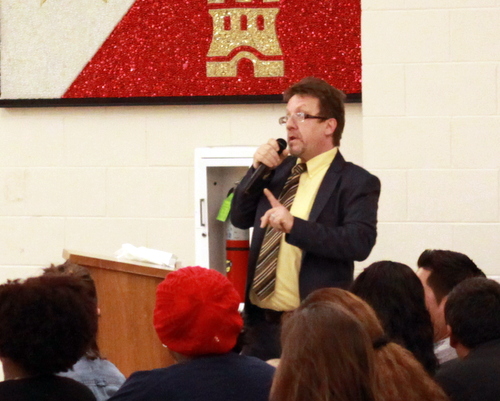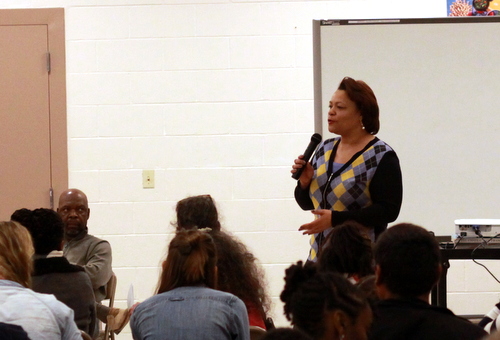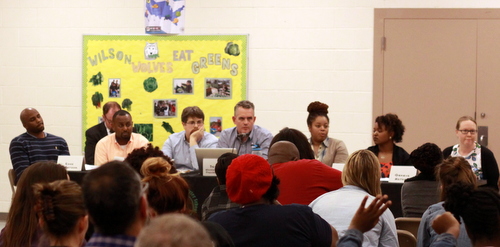
Andrew H. Wilson Charter School principal speaks to more than 100 people gathered at the school Tuesday night. (Robert Morris, UptownMessenger.com)
The impending loss of the charter at Andrew H. Wilson charter school in Broadmoor — one of New Orleans’ most deeply established and celebrated charter schools, but also one of the city’s lowest ranked campuses in state scores — has parents in the community deeply upset.
The school’s strengths, they said at a heated public meeting Tuesday night, run far deeper than superficial and unfairly-calculated test scores show, and they fear that the individualized care they are used to their children receiving will give way to a cookie-cutter approach if a larger operator takes over.
The school was one of the first to reopen after Hurricane Katrina, but its future has been in question since state performance scores were released in October that showed Wilson tumbling from a ‘D’ rank and 63.3 grade in 2012-13 to a ‘F’ rank at 49.1 in 2013-14. Earlier this month, the state Board of Elementary and Secondary Education announced that Wilson’s charter would not be renewed, effectively dissolving the board and turning the campus over to a new operator.
The school board had initially considered a lawsuit challenging the calculation of the 49.1 grade, but then changed course, deciding instead to concede the charter in exchange for some control over the transition.
That choice, however, rankled many parents. More than 100 people showed up to a meeting about the issue Tuesday night, and among the many parents and teachers were also representatives of local- and state-level education agencies and numerous other charter school operators.
Parent after parent took the microphone, describing the specific challenges their children faced when they started school at Wilson and the extraordinary lengths taken by the teachers and administrators to address them. Many feared those staff members will be cast aside, and urged the board to challenge the state’s decision, nearly all repeating the same word: “fight.”
“They have done an exceptional job for my daughter, and still, to this day, they fight,” said one woman, Danielle Wilson, almost at the point of tears as she spoke. “For every child in this school, they work tirelessly. You guys need to fight.”
Logan Crowe, who introduced himself as “the very proud principal of Andrew H. Wilson Charter School” to cheers and applause when he took the microphone, suggested that the fate of Wilson is part of a larger problem with school reform in Louisiana. As other, lower-performing schools have been closed, Wilson welcomed their students, no matter how many grades behind their testing showed them to be, Crowe said.
“We’ve watched the RSD systematically close schools for the impoverished and the disadvantaged for the last 10 years,” Crowe said. “But we open these doors to everybody.”
Many schools try to get rid of their lowest-performing students, or at least to hold them back, in order to boost their own test scores, Crowe said. But Wilson prides itself on having one of the lowest expulsion rates in the city, on the theory that they are better off in the classroom than on the street. As a result, a full third of the Wilson student body is in some sort of academic intervention program, he said.
“I could have made 26 expulsions last year, and I promise that would have given us nine-tenths of a point,” Crowe said, referring to the 49.1 score’s near miss of the threshold to earn a D.
Tessa Jackson, board chair of the Milestone Charter School in Jefferson Parish, echoed Crowe’s complaints. Schools should be graded not solely on how the students perform on standardized tests, but also on how much they have improved — which may be a better reflection of how much education is being provided, rather than simply how strong a background the child comes from.
“You guys are fighting the wrong fight. … Charter schools are incentivized to recruit and retain high performing students,” Tessa Jackson said. “What Wilson says is, ‘We will take your child and we will work with your child.’ Frankly, the Wilsons of the world get punished for that.”
Griselda Jackson, the former president of the Crocker charter school board that was dissolved a few years ago, told the audience that she has been through the same situation. But Crocker was given some standing in the transition to the school’s takeover by New Orleans College Prep — it was allowed to keep the historic Crocker name, and just over half the teachers who applied to stay were retained — and it is those important elements that parents should prioritize instead of a battle with the state that they ultimately cannot win, she said.
“I know the bitter pill that you are swallowing. I know the disappointment. I know the tears. I know the sadness,” Griselda Jackson said. “But I would caution you as to how you’re going to fight. Because the people at BESE are so far removed, and that’s just the truth. They’re well-meaning, they may be well intentioned, but they’ve got a framework set up that is backed up by the law, and unless you change the framework you’re not going to change the outcome.”

City Councilwoman LaToya Cantrell addresses the audience. (Robert Morris, UptownMessenger.com)
City Councilwoman LaToya Cantrell, who previously served as chair of Wilson’s governing board before her election, said that she supports the compromise with the state not because it is right, but because it represents the most realistic path forward — minimizing the change, rather than trying unsuccessfully to stop it. The compromise allows the school to retain the relationship with Broadmoor, guarantees staff members consideration to retain their jobs, and even gives the school community some say in the selection of a new operator.
Cantrell said she also agrees with Crowe and Jackson about the larger structural problems with the way the state evaluates schools. But just because Wilson may not have gotten a fair shake, she said, doesn’t mean the performance last year was acceptable.
“Clearly, improvements need to be made. You can’t argue that,” Cantrell said. “What’s happened to Wilson, I don’t believe it’s fair, but it’s the reality. The future of Wilson is going to be great.”

The Wilson governing board listens to parents’ concerns during the meeting. (Robert Morris, UptownMessenger.com)
A fascinating, insight into the Broadmoor community.
No one questions whether the good folks at Wilson work hard or care about their students, but the fact of the matter is Wilson hasn’t performed.
It’s disingenuous for anyone to claim that Wilson is somehow the victim of the RSD’s faulty oversight systems. First of all, all charters in the RSD are judged by the same metrics and other schools with similar demographics have been able to make gains. Second, Crowe couldn’t have “made 26 expulsions last year” because there is a centralized expulsion process in the RSD to ensure kids are not unfairly being pushed out of schools – those determinations are made centrally. Finally, although Wilson may have “welcomed their students, no matter how many grades behind their testing showed them to be,” they didn’t have much choice in any case, since all schools participate in the city-wide enrollment system, OneApp.
How can you claim an evaluation system that only considers academic ability at a single point in time (eg, whether a kid is reading on a 4th grade level when he takes the LEAP/PARC in April) versus how much growth has occurred over the course of the school year (whether the same student was reading on a 2nd, 3rd or 4th grade level, eight months earlier), is fair? Wilson had over 100 NEW students who were at least one or more grades behind, many of them pushed or counseled out of RSD school that received C grades.
I agree with Peter. This feels like an ideal moment for the community and the students to rally – for parents and teachers to work together to raise the test scores of all students, not just their own – this feels a bit like the 1989 hit “Lean On Me.” And that’s ok- best wishes to the Wilson community! Your hard work Will pay off
Peter put it exactly right….all schools are evaluated by the same criteria and other schools with a similar challenging student community have made progress. Wilson is going backward! We can not go back to the days when failing schools were allowed to continue to fail our students and community just because the school was liked by the neighborhood. Our children, city, and country deserve better than a school that is graded as low as Wilson has been consistently graded.